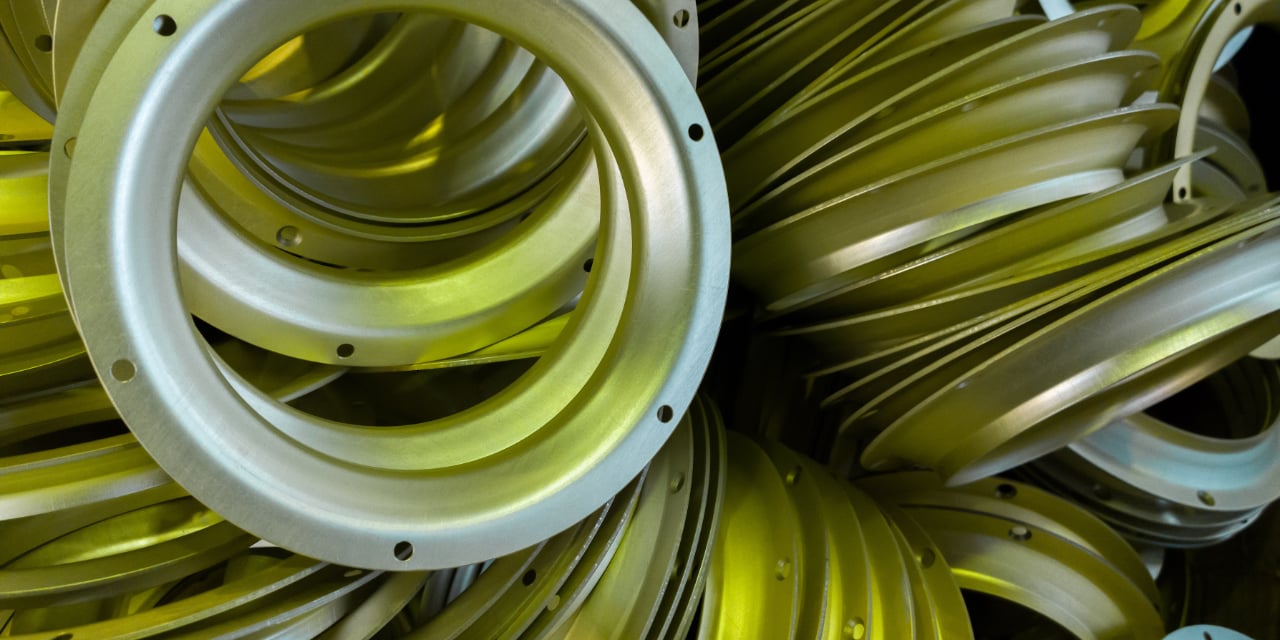Choosing the appropriate metal for your stamped part can be tricky. In some cases, there are parts that could be made from several different materials. It’s important to compare materials to determine how your choice could affect the stamping’s function and performance.
Aluminum is the ideal metal for parts that need strength and flexibility at a much lower weight than most other metals can provide. Aluminum is often chosen over stainless steel since it is less expensive and a third of the weight. With the push for lightweight vehicles, many automotive parts that were traditionally made from steel are now made from aluminum.
Properties of Aluminum
Soft and Lightweight
Aluminum is a soft metal that can be bent and shaped easily. It is lightweight, making it ideal for the automotive and aerospace industries where reduced weight improves fuel economy and results in cost savings.
Reflective
Aluminum reflects both light and heat, making it an exceptional choice for lighting fixtures and solar reflectors.
Highly Drawable
Aluminum can be pulled into various shapes relatively easy. This makes it an ideal choice for applications such as coils or springs that require bending without breaking.
Ductile and Malleable
Aluminum has a low melting point that allows flexible formation throughout product development. Aluminum is the second most malleable metal available.
Corrosion Resistant
Aluminum resists corrosion and will not rust, making it an excellent choice for environmental conditions containing corrosive elements.
Conductive
Aluminum is an excellent conductor of electrical currents. This makes it ideal for use in electronic components.
Non-Toxic
Aluminum prevents toxins from leaking and does not impart a metal taste in packaging.
Non-Magnetic and Non-Sparking
Aluminum is a non-ferrous metal, so it is also non-magnetic. It is a non-sparking metal, so it's an excellent choice for use in environments with flammable chemicals.
Sustainable
Aluminum is easily recycled without deterioration. Producing it from scrap uses less energy than from raw materials.
Smooth Shiny Finish
Aluminum has an attractive finish that requires little to no maintenance.
Aluminum Alloys
For stamping operations, pure aluminum is often alloyed with other metals including copper, iron, magnesium, manganese, silicon and zinc to increase strength or to add or enhance material properties to improve product performance. A variety of coatings can also be applied to increase corrosion resistant, thermal and electrical properties.
Some of the most commonly used alloys in metal stamping include:
- 1100: 1100 alloys have a minimum aluminum content of 99%. It is recommended for projects requiring challenging forming operations due to its softness, ductility, and workability. 1100 has the highest thermal and electrical conductivity.
- 3003:This aluminum-manganese alloy has greater tensile strength than 1100 and is the most used aluminum alloy. It also demonstrates good corrosion-resistance and workability.
- 5052: This aluminum-magnesium alloy has the highest strength alloy of the non-heat-treatable grades. The alloy offers superb corrosion resistance, making it ideal for marine applications.
- 6061: This aluminum-magnesium-silicon alloy is the most versatile heat-treatable alloy. This alloy is corrosion resistant, formable and weldable and ideal for aerospace and automotive applications.
Industries that Use Aluminum Stamping
Due to its many advantages, aluminum is used by nearly every major industry. Some of the industries that most regularly use aluminum stampings include:
- Automotive
- Construction
- Aerospace
- Marine
- Lighting
- Electronics
- Medical
Components Made from Aluminum
Some of the parts typically stamped from aluminum include:
- Brackets
- Hose Clamps
- Clips
- Connectors
- Pistons
- Busbars
- Medical and Testing Device Closures
- Heat sinks
- Batteries
- Chemical equipment
Is Aluminum the Right Choice for Your Stamping Project?
When the product needs to be lightweight yet durable, aluminum is a good option. If you are unsure if aluminum is strong enough for your application, your metal stamping partner can work with you to select the ideal aluminum alloy based on your specific product performance requirements.


